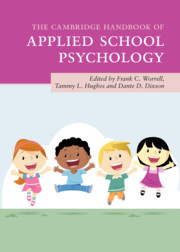Book contents
- The Cambridge Handbook of Applied School Psychology
- The Cambridge Handbook of Applied School Psychology
- Copyright page
- Contents
- Contributors
- Contributor Biographies
- Acknowledgments
- 1 Broadening the Focus of School Psychology Practice
- Part I Individual-Level Academic Interventions
- Part II Teacher- and System-Level Interventions
- Part III Interventions from Educational and Social/Personality Psychology
- Part IV Behavioral and Social-Emotional Interventions
- Part V Health and Pediatric Interventions
- Part VI Family Connections and Life Transitions
- 30 Parent–Teacher Relationships
- 31 The School Psychologist’s Role in Facilitating the Transition to College
- 32 Transition from School to Work within a Theory-based Problem-Solving Framework
- Part VII Special Populations
- Part VIII Conclusion
- Index
- References
32 - Transition from School to Work within a Theory-based Problem-Solving Framework
from Part VI - Family Connections and Life Transitions
Published online by Cambridge University Press: 18 September 2020
- The Cambridge Handbook of Applied School Psychology
- The Cambridge Handbook of Applied School Psychology
- Copyright page
- Contents
- Contributors
- Contributor Biographies
- Acknowledgments
- 1 Broadening the Focus of School Psychology Practice
- Part I Individual-Level Academic Interventions
- Part II Teacher- and System-Level Interventions
- Part III Interventions from Educational and Social/Personality Psychology
- Part IV Behavioral and Social-Emotional Interventions
- Part V Health and Pediatric Interventions
- Part VI Family Connections and Life Transitions
- 30 Parent–Teacher Relationships
- 31 The School Psychologist’s Role in Facilitating the Transition to College
- 32 Transition from School to Work within a Theory-based Problem-Solving Framework
- Part VII Special Populations
- Part VIII Conclusion
- Index
- References
Summary
School-based transition planning is legally mandated for all students with disabilities. Much of the existing school psychology literature discusses procedures to construct a transition plan, with little attention given to evaluating the effectiveness of the plan. In this chapter, we argue that school-to-work transition planning should occur within a problem-solving framework as it is rare that a transition plan will be entirely successful as originally written. As such, transition-planning steps should include (a) identification of transition-plan goals, (b) analysis of transition needs and strengths, (c) transition-plan implementation and monitoring, and (d) transition-plan evaluation and adjustment. We also extend the school psychology literature by applying the person–environment–occupation (PEO) model (Law et al., 1996) to transition problem solving. Implications for the roles of school psychologists engaged in transition planning are discussed throughout.
Keywords
- Type
- Chapter
- Information
- The Cambridge Handbook of Applied School Psychology , pp. 553 - 576Publisher: Cambridge University PressPrint publication year: 2020

